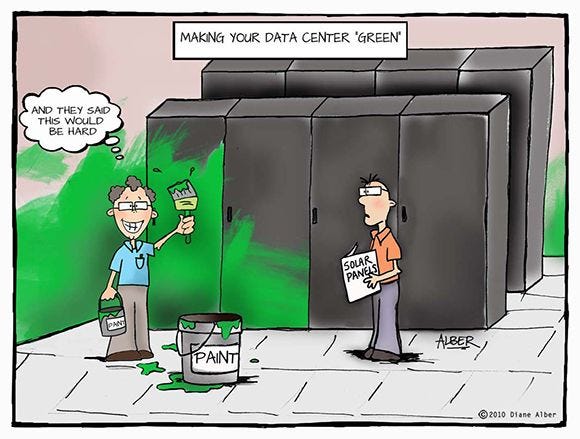TCC #69 — Clouded judgment
Big Tech’s emissions math isn’t adding up — and what it means for climate credibility
Hello friendlies,
Meg here, it’s been a while!! Shout out to my better business half for keeping this newsletter running while I decidedly, er, did not. Thanks Amelia!
Somehow, summer seems to be the busy season at The Climate Hub. Despite that, I am determined to make this summer feel like a summer. Loooots going on. My little fam put an offer on our dream house two days ago (it’s a green house on Brockley street, I mean, come on 😭) — accepting good vibes; the market here is bonkers! I’m writing this on a Wednesday because we’re gearing up from Thursday and taking our three-year-old to her first ever music festival. A good move? Time will tell…
Anywho, let’s get into it.
This week, we’re following along with the seemingly never-ending saga of Big Tech Bad News. But Brazil and France are taking a stand against false narratives — we like that!
This week’s briefing
❌ What’s bad
Big tech stays at it
This past Sunday, organizations including the Sierra Club, League of Conservation Votes, Public Citizen, and Amazon Employees for Climate Justice, published an open letter in the San Francisco Chronicle and the Seattle Times, penned to Amazon, Google, Meta, and Microsoft CEOs: CLEAN UP THE CLOUD.
Google’s latest sustainability report stated its carbon emissions increased 51% between 2019 and 2024. That’s an already enormous figure. Yet, a report authored by non-profit advocacy group Kairos Fellowship found that Google’s carbon emissions actually went up by 65% in the same time period.
The report is damning, saying that Google:
Relies heavily on speculative technologies to achieve its net-zero goals
Presents misleading data (Google says it has improved the energy efficiency of its data centers by 50% over 13 years. Kairos argues that citing energy efficiency numbers rather than sharing absolute ones obscures Google’s total emissions)
Opts for corporate-friendly metrics (market-based emissions rather than location-based emissions)
Has ultimately increased its total energy consumption 1,282% since 2010
Meanwhile, Amazon investors strike down all its shareholder proposals (again). One would have required additional reporting on Amazon’s carbon emissions. Another targeted the climate impact of its data centers, and a third called for greater disclosure around packaging materials.
It’s getting harder and harder to believe that big tech will save us in any way when it’s clear they’re unwilling to clean up even their own acts.
What this means for climate comms:
If the companies selling AI, cloud computing, and ad platforms can’t tell the truth about their climate impact, why should anyone believe your climate claims? As communicators, we have to remember that selective transparency — like highlighting efficiency gains without absolute emissions — can easily erode trust. Clear, honest numbers matter more than aspirational net-zero pledges.
✅ What’s good
A joint effort to combat climate disinformation
This is a CLEAR stand against the anti-science, anti-intellectual, anti-moral clusterfuck much of the world finds itself in today.
France and Brazil co-authored the “Joint France-Brazil press release: accelerating climate action.” 👇
“Launched in partnership with the UN and UNESCO, and supported by several other nations […] and organizations, this initiative is the first official multilateral recognition of the danger of disinformation on climate action. It will develop effective strategies against the spread of false narratives, support independent journalism, protect environmental defenders, and advocate for the democratic regulation of social media platforms, thereby setting a global benchmark for tackling disinformation in the digital age.”
Bravo. Let’s hope others follow suit.
What this means for climate comms:
Disinformation is a systemic risk for anyone communicating climate action. This joint initiative shows that tackling false narratives is becoming a recognized priority at the highest levels. Communicators should see this as a green light to call out misinformation more confidently — and to proactively build trust by rooting messaging in verifiable facts and context.
What we’re reading this week
📚 Book: The Known World — Feels like I’ve been reading this one for weeks. (My daughter, whose sleep patterns as an infant were so enviable I feared speaking of them to other new moms for fear of ostracism, has decided she *hates* bedtime.) This book though: a feat of moral intricacy.
📖 Article: What I Learned from My Mother and the Postal Service — sent this one to my family group chat with a one-line explanation: “This was a startlingly touching piece touching on everything going wrong in the U.S. right now.”
What we’re working on
👉 We’ve been ramping up with a new carbon credit ratings company. Part of our work together includes diagnosing current opportunities and weaknesses in their marketing funnel. We’ll follow it up with a 6-month content plan. Most of you already know Amelia and I are all up in the carbon markets, so this one is right in our sweet spot.
Ways we can help 🫶
🎯 Want to make your sales team’s dreams come true? → Funnel high-quality MQLs and SQLs into your pipeline with a system of clear, credible, and commercially sharp content.
🌟 Need help getting your customers to understand your value? → Define your positioning, uncover your most marketable messages, and finally resonate with your buyers.
📣 Need serious marketing help but don’t know where to start? → Our 90-day ‘Rent-A-CMO’ package helps you get a proper grip on your marketing funnel, identify your friction points, and find new opportunities to pursue.



